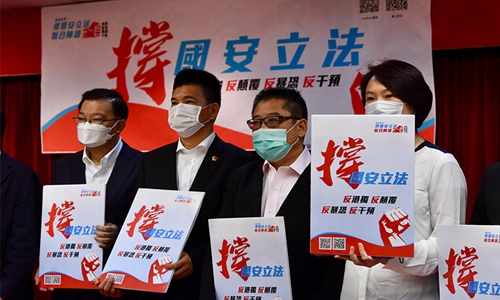Draft of national security law for HK positive sign
By Tian Feilong Source:Global Times Published: 2020/6/21 18:23:40

The United Front Supporting National Security Legislation holds a press conference on June 8, saying that 2.92 million Hong Kong citizens have signed a petition in support of the proposed national security legislation. Photo: cnsphoto
A draft law on safeguarding national security in the Hong Kong Special Administrative Region (HKSAR) of the People's Republic of China was submitted for deliberation at the 19th session of the Standing Committee of the 13th National People's Congress (NPC) from Thursday to Saturday. This move substantially sped up the process of the Hong Kong-related legislation which has attracted worldwide attention.
After provisions of the draft law were released, many of the earlier demonizations, distortions and objections regarding it have fallen apart. The basic principles and framework of the draft are in compliance with China's Constitution, the Basic Law of HKSAR and the institutional norms determined by the NPC, which demonstrates the adherence to basic human rights, the rule of law standards, and the respect and absorption of Hong Kong's common law mechanism.
After the NPC passed a decision on establishing the national security law for Hong Kong on May 28, opposition voices in and out of Hong Kong kept emerging. The US announced it would start to end Hong Kong's preferential treatment; the foreign ministers of G7 issued a joint statement and made unwarranted comments on the national security legislation for Hong Kong; the local opposition in Hong Kong even plotted to stage a second round of anti-extradition bill protests to fight against the national security legislation. The fierce opposition from both inside and outside Hong Kong was anticipated by the central government. This further indicates there are national security loopholes in Hong Kong and the city is facing a grim situation in its national security legislation.
The draft law provides basic clues and confidence for the Hong Kong society to understand the national security legislation.
First, the law completely respects the local autonomy of Hong Kong under the principle of "one country, two systems." It grants most jurisdiction to local authorities in Hong Kong, while the central government retains direct jurisdiction only in special circumstances.
Second, the law highly respects and absorbs Hong Kong's existing human rights and rule of law standards. It attaches great importance to linking up with Hong Kong's common law mechanism, so as to minimize the impact of the law on Hong Kong's existing rule of law but maximize the benefits.
Third, this law fully takes into account the particularity and complexity of national security cases. The central government will establish national security agencies in Hong Kong in accordance with the law to assume the statutory duties of making policies, gathering intelligence, supervising and guiding Hong Kong's enforcement of law.
Fourth, Hong Kong itself has the primary responsibility for law enforcement and the establishment of specialized agencies, including the establishment of commission of safeguarding national security by the Hong Kong SAR government, and the establishment of a special unit by the police force and the Department of Justice. The HKSAR Chief Executive shall appoint judges to handle national security cases. These are indispensable components of the implementation mechanism of the national security law. It is also the responsibility the HKSAR government should bear in implementing the law.
Looking ahead, the enactment of the national security law will create a prosperous, stable, free and secure social order and a development foundation for Hong Kong citizens.
First, national security is closely related to the social and personal security of Hong Kong. The effective implementation of the National Security Law can destroy attempts of local extremist forces and external forces to subvert the city's rule of law and social order, and restore the free and peaceful life of Hong Kong citizens.
Second, the national security law is conducive to the rapid completion of the process of ending violence and chaos in Hong Kong society and social reconciliation and reconstruction. It will help restore public confidence.
Third, the national security law will help stabilize Hong Kong's status as an international financial center to further attract international investment.
Fourth, the national security law will establish a correct view of state, and standards of what is right and wrong for Hong Kong society. It can provide citizens with clear and powerful legal weapons to fight violent extremists.
The timely enactment and implementation of the Hong Kong national security law will be a major step forward in strengthening and improving the rule of law in the city. It is a structural breakthrough in the governance of Hong Kong It is an exemplary project of the "one country, two systems" principle, and a key institutional guarantee for China's continued modernization and internationalization strategy of the 21st century.
The author is associate professor at Beihang University in Beijing and a member of Beijing-based Chinese Association of Hong Kong and Macao Studies. opinion@globaltimes.com.cn
Posted in: VIEWPOINT